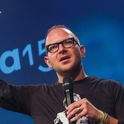
The format remains counter-intuitive. In an era in which many fashionable ideas gatherings lean towards the “un-conference” format, and spout platitudes about the “group formerly known as the audience”, this was clinically scripted stuff. One opportunity for questions (largely taken up by audience praise for the conference itself), no audience interaction, no over-running of speeches, no walking into the auditorium during speeches, no laptops, and no phones. In the end this seemed a strength - a welcome strain of authoritarianism, which even the super-liberated TEDsters seemed to enjoy.
So what were the ideas? Paul Romer I mentioned yesterday; a genuinely arresting and divisive thought. Of the rest, the 5 that most caught my eye were:
- Parag Khanna (recently seen in Prospect with an essay on China) did a potted version of parts of his book Second World, complete with stunning visuals. His best point was about how migration from China into Siberian Russia is creating a greater China (with 6m Russians and many more Han Chinese immigrants) struck me in particular.
- Evgeny Morozy, a Belarussian internet expert who blogs at Foreign Policy magazine, injected a healthy dose of techno scepticism into the second day, arguing convincingly that electronic networks are generally a boon for repressive regimes, and taking on what he called “iPod Liberalism”.
- Economist Loretta Noleoni gave an intriguing insight into the way in which terror groups tend to be defined not by ideology, but by the requirement to raise funds to plan their attacks.
- MIT neuroscientist Rebecca Saxe put more bones on themes Nigel Warburton and David Edmunds talked about in their X-phi article a few months back, talking about how neurological “transcranial magnetic stimulation” machines can be used to change our moral senses – and confirmed she was pestered by the Pentagon for more info on quite how to do it.
- Physicist Garik Israelian gave a talk of which I understood perhaps 1 word in 10, but predicted that scientists would find a “biosphere” capable of supporting life in another universe in the next two decades.











